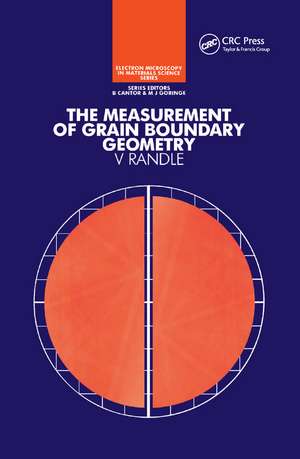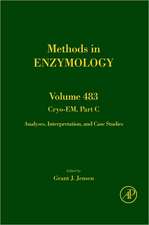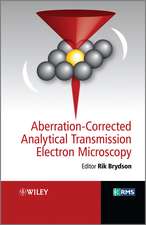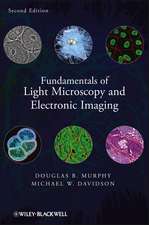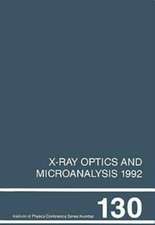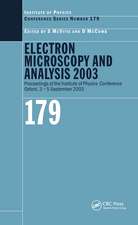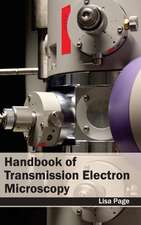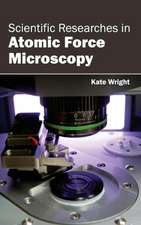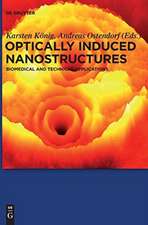The Measurement of Grain Boundary Geometry: Series in Microscopy in Materials Science
Autor Valerie Randleen Limba Engleză Paperback – 11 sep 2019
Studying material properties from their geometrical measurements, The Measurement of Grain Boundary Geometry provides a framework for a specialized application of electron microscopy for metals and alloys and, by extension, for ceramics, minerals, and semiconductors. The book presents an overview of the developments in the theory of grain boundary geometry and its practical applications in material engineering. It also covers the tunneling electron microscope (TEM), experimental aspects of data collection, data processing, and examples from actual investigations. Each step of the analysis process is clearly described, from data collection through processing, analysis, representation, and display to applications. The book also includes a glossary of terms.
Exploring both the experimental and analytical aspects of the subject, this practical reference guide is essential for researchers and students involved in material properties, whether in physics, materials science, metallurgy, or physical chemistry.
| Toate formatele și edițiile | Preț | Express |
|---|---|---|
| Paperback (1) | 389.38 lei 6-8 săpt. | |
| CRC Press – 11 sep 2019 | 389.38 lei 6-8 săpt. | |
| Hardback (1) | 1655.37 lei 6-8 săpt. | |
| CRC Press – iun 1993 | 1655.37 lei 6-8 săpt. |
Preț: 389.38 lei
Nou
Puncte Express: 584
Preț estimativ în valută:
74.51€ • 77.35$ • 62.13£
74.51€ • 77.35$ • 62.13£
Carte tipărită la comandă
Livrare economică 22 martie-05 aprilie
Preluare comenzi: 021 569.72.76
Specificații
ISBN-13: 9780367402358
ISBN-10: 0367402351
Pagini: 182
Dimensiuni: 156 x 234 x 8 mm
Greutate: 0.45 kg
Ediția:1
Editura: CRC Press
Colecția CRC Press
Seria Series in Microscopy in Materials Science
ISBN-10: 0367402351
Pagini: 182
Dimensiuni: 156 x 234 x 8 mm
Greutate: 0.45 kg
Ediția:1
Editura: CRC Press
Colecția CRC Press
Seria Series in Microscopy in Materials Science
Public țintă
Professional Practice & DevelopmentCuprins
Foreword. Glossary. Introduction. Theoretical aspects of grain boundary geometry I: general boundaries. Theoretical aspects of grain boundary geometry II: periodic geometries. Experimental methods. Data interpretation and processing. Data representation and display. Experimental investigations to measure grain boundary geometry. Appendix. References. Index.
Recenzii
"…could not have been prepared at a more appropriate time. … will definitely serve as a major contributor to the industrial implementation of interface engineering by serving as a training text for undergraduate and graduate students and as an extremely useful reference text for industry-based scientists and engineers."
-Dr. G. Palumbo, Research Division, Ontario Hydro
"The huge Table 7.1, which sets out this information in a systematic way, would alone justify purchase of this book! … a most useful practical textbook."
-R.W. Cahn, Contemporary Physics, Vol. 35, No. 4, 1994, pp. 306-307
"… deals with the technical difficulty of describing grain boundary geometry as well as methods of measuring it in considerable detail. … very readable. …"
-Professor B. Cantor, Series Editor
-Dr. G. Palumbo, Research Division, Ontario Hydro
"The huge Table 7.1, which sets out this information in a systematic way, would alone justify purchase of this book! … a most useful practical textbook."
-R.W. Cahn, Contemporary Physics, Vol. 35, No. 4, 1994, pp. 306-307
"… deals with the technical difficulty of describing grain boundary geometry as well as methods of measuring it in considerable detail. … very readable. …"
-Professor B. Cantor, Series Editor
Descriere
Studying material properties from their geometrical measurements, The Measurement of Grain Boundary Geometry provides a framework for a specialized application of electron microscopy for metals and alloys and, by extension, for ceramics, minerals, and semiconductors. The book presents an overview of the developments in the theory of grain boundary geometry and its practical applications in material engineering. It also covers the tunneling electron microscope (TEM), experimental aspects of data collection, data processing, and examples from actual investigations. Each step of the analysis process is clearly described, from data collection through processing, analysis, representation, and display to applications.
